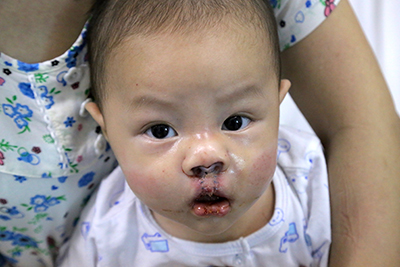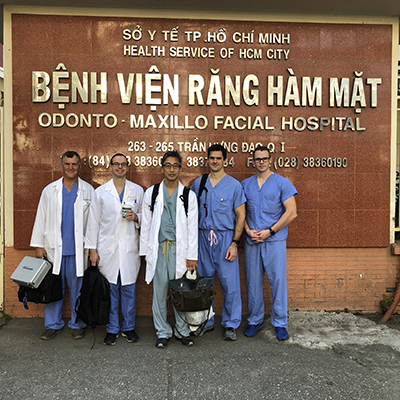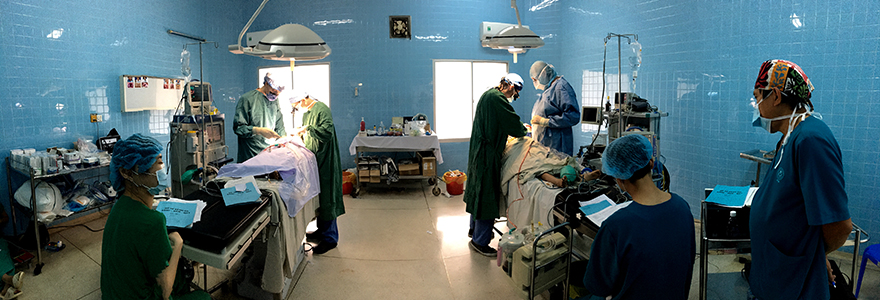Changing smiles and forging connections: 20 years of humanitarian work
By Alexandra Burza, MMJC '19
As a young oral and maxillofacial surgery fellow at Dalhousie University, Dr. Michael Shimizu was presented with a unique opportunity to change lives; one that inspired a two decade-long commitment to overseas humanitarian work.
In 1999, on the invitation of his mentor, Dr. David Precious, Dr. Shimizu agreed to join a team of surgeons from Dalhousie and another from Japan on a mission to Vietnam. The purpose of their trip was to help local surgeons tackle the extraordinary demand for cleft palate and lip surgery, and offer pro-bono surgeries for those in greatest need.
“It was rewarding to be able to go there and within two hours change someone’s life completely,” Dr. Shimizu said.
“Even with the language barrier, you could see the gratitude in their eyes. I remember one man who was getting married, but really wanted this surgery done before he got married. I think it was a life-changer for him, and he cried afterward. It was just fantastic to give him that.”
 For two weeks, the surgeons operated from morning to night in four simultaneous operating rooms. Dr. Shimizu fondly remembers the friendships formed with the Japanese surgical team and the local Vietnamese anesthesiologists, nurses and surgeons. In addition to transforming the faces of patients in need, he says Dr. Precious had hoped the mission would help create collegiality among the surgeons that would extend beyond the two weeks in Vietnam.
For two weeks, the surgeons operated from morning to night in four simultaneous operating rooms. Dr. Shimizu fondly remembers the friendships formed with the Japanese surgical team and the local Vietnamese anesthesiologists, nurses and surgeons. In addition to transforming the faces of patients in need, he says Dr. Precious had hoped the mission would help create collegiality among the surgeons that would extend beyond the two weeks in Vietnam.
“He was determined to not just make good surgeons out of his residents, but also make us good citizens of society. He taught us a lot about giving back to the community, and being a part of your community. He would even have sessions about music and theatre just so that we could become a bit more attuned to the rest of the world,” Dr. Shimizu explained, recalling his time studying under his mentor.
After returning home from Vietnam and settling into a new faculty position as a Professor in Oral and Maxillofacial Surgery at the Schulich School of Medicine & Dentistry, Dr. Precious approached him once again to join an international mission. This time led by a California-based Tunisian surgeon, Dr. Slim Bouchoucha, who wanted to address the need for cleft surgeries in his home country.
For the next 12 years, Dr. Shimizu returned to Tunisia annually, operating on countless patients in Tunis, Sfax and Sous se, while Dr. Precious persisted with the mission in Vietnam. As in Vietnam, the demand for the cleft lip and palate surgery in Tunisia far exceeded the capacities of the local surgeons. Although most patients were infants and children, many adult patients had been waiting to receive the surgery their whole lives.
“These adult patients lived where they were basically shunned from society because of their cleft deformity,” Dr. Shimizu explained. “They just have that one deformity in the lip and nose area, and are usually otherwise healthy. But many did have a very tough time because of the cruelty they faced from others.”
 The missions to Tunisia eventually had to stop when insurgence and upheaval caused by the Arab Spring revolution posed a threat to the visiting surgeons and operations at local hospitals. With the future of this mission still uncertain, Dr. Shimizu was invited to return to Vietnam in 2015 after being away for 16 years.
The missions to Tunisia eventually had to stop when insurgence and upheaval caused by the Arab Spring revolution posed a threat to the visiting surgeons and operations at local hospitals. With the future of this mission still uncertain, Dr. Shimizu was invited to return to Vietnam in 2015 after being away for 16 years.
“The change in the culture and the society was huge, but the need for this mission hadn’t changed, it was still there. And I got to work with the same team of surgeons I worked with in 1999,” he said.
Dr. Shimizu says he has always kept in touch with the surgeons he has met throughout the course of his humanitarian career, and the opportunity to collaborate with colleagues from around the world has been a great personal benefit of these trips.
Although COVID-19 related travel restrictions have put a pause on their humanitarian work this past year, Dr. Shimizu says he, as well as his international colleagues are looking forward to meeting in Vietnam again.
“When I go on these missions to operate, I get to work alongside my friends from Halifax, Alberta, the United States, Japan and Italy. We trade ideas back and forth regularly,” Dr. Shimizu shared. “If you continue to seek out opportunities like these and aren’t afraid to ask questions, you continue to be better. And that should be your goal as a surgeon .”









